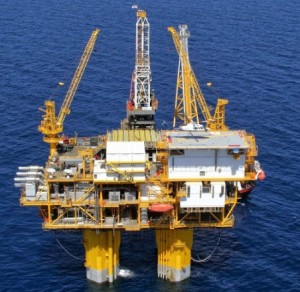Fishers told to stay off Ghana’s oil rigs
 The Chief Executive Officer of the Petroleum Commission, Mr Egbert Faibile Jnr. Has called on traditional authorities in the Western Region to help control incursions from some fishermen around Ghana’s Oil Rigs and the exclusive zone.
The Chief Executive Officer of the Petroleum Commission, Mr Egbert Faibile Jnr. Has called on traditional authorities in the Western Region to help control incursions from some fishermen around Ghana’s Oil Rigs and the exclusive zone.
He said, “Let just imagine how we get scared when we are around vehicles with an inscription, ‘Highly Inflammable’ …we are in a hurry to avoid its closeness to us or even go nearer.
So how come, our fishermen would want to play with their lives and that of the country by going around that huge investment with flammable materials in their boats or canoes.”
The CEO said any such unfortunate situation could cost the country billions of dollars, the loss of precious lives and create a national emergency, needing lots of financial resources to repair the damage.
He, therefore, pleaded with the Chiefs to help educate the fishermen to stop the incessant incursions around the rigs offshore Ghana’s waters.
Mr Faibile was speaking at the end of year engagement with the Western Regional House of Chiefs to update them on happenings in the oil and gas upstream sector, solicit for good counsel to improve community relationships and the general growth of the oil and gas sector.
“As a Commission, we appreciate the relationship we have built over the years. Being a major stakeholder in the upstream sector, your contributions to our operations have been of immense benefit; an achievement we are always grateful for.”
The Petroleum Commission, he noted, understood that the Chiefs and Traditional Rulers were best placed to understand the needs and aspirations of the people, the challenges of the local environment and local economy, including the fisheries sector and the dynamics of the different groups living in the local environment.
Meanwhile, the Joint Petroleum Commission-Western Region House of Chiefs Working Group also meets twice yearly to discuss urgent and recurring social and community-related issues within the Region although the Coronavirus pandemic had halted it over the last two years.
“I encourage the Working Group to remain steadfast with its mission of establishing the linkage between oil and gas and the regional economy, providing alternative livelihood for households who may be affected by the oil and gas sector, among others”.
Mr Faibile, therefore, stressed the need for, trust, engagement, participation and accountability to sustain the partnership to yield positive results.
He mentioned some key activities executed by the Commission in 2021 as the Cumulative Impact Co-Management Platform, the accelerated oil and gas capacity project and the incursion sensitization campaign, among others.
The CEO said the Commission, in adopting the recommendations of the Safe Sea Access Framework, agreed with relevant stakeholders to set up the Cumulative Impact Co-Management Platform.
According to him, the main purpose of the Platform was to facilitate a coordinated approach to the effective management of cumulative impacts of offshore oil and gas project development and production operations in the Western Region.
He said the Accelerated Oil and Gas Capacity Building Project (AOGC) was established in November 2017 to enhance the capacity of Ghanaians to enable them to work in the oil and gas sector.
“So far some 150 students have benefited and are presently in residence at the Jubilee Technical Training Centre (JTTC) of the Takoradi Technical University (TTU) and are being trained to acquire vocational, practical and hands-on skills that will position the trainees to take opportunities in the upstream oil and gas industry”.
Each of the trainees, he said, would be awarded a City and Guilds International Vocational Qualification (IVQ) Level III Certificate.
Mr Faibile Jnr said the Commission also collaborated with the Ghana National Canoe Fishermen Council (GNCFC) to embark on a community sensitization exercise at selected landing beaches along the four Coastal Regions of Ghana.
The purpose of the exercise, he noted, was to provide fisher-folks with industry updates and education on the Exclusive Zones (EZs) in accordance with the Safe Sea Access Framework (SSAF) to ensure a reduction in incursions into the marked safety zones by fishing activities.
Ms Phoebe Afful, an Officer of the Monitoring and Evaluation Department of the Commission, who updated the House on Exploration and Production Activities, said the country has 14 agreements currently active under 11 companies.
She noted that exploration activities around the Voltaran Basin were also yielding an impressive outlook and prayed that in 2022 more Appraisals would be done, additional Production reserves created and existing companies acquiring more blocks.
Nana Kobena Nketsia V, the Paramount Chief of Essikado, who chaired the meeting appreciated the excellent commitment of the Commission to advancing Ghana’s oil and gas upstream sector.
He stressed the need for more indigenous companies to operate in the space while attention was also given to the fisheries sector for mutual growth, trust and peaceful coexistence.
The Paramount Chief later reminded the Commission of some promises to resource the Regional House and urged that it was redeemed on time.
Source: GNA
